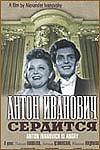Kilchevskij was born on October 11 (23), 1899 in the village of Lipnishki, Oshmjan district, Belarus. He started singing when he
was drafted into the Red Army, in an amateur soldiers' ensemble. He embarked on vocal studies late (in 1932) at the 3rd Musical College
in Leningrad, and then at the conservatory with Sofija Akimova-Ershova (1887–1972), wife of Ivan Ershov. In 1933, Kilchevskij actively participated, together with P. Lisitsian and L.
Lavrovsky, in the creation of a youth opera troupe. 1934–1935, Kilchevskij sang in stagings of the Opera Studio of the
conservatory, simultaneously giving lectures in the philosophy department, another field in which he had a great interest.
In 1936 he graduated from the conservatory and became a soloist of the Leningrad Malij Opera Theater. From 1944, he performed at the
Leningrad Kirov Opera and Ballet Theater.
1947 to 1955, Kilchevskij was a soloist of the Bolshoj, and in 1951–1952, he was the Bolshoj's vice director.
In the repertoire of Kilchevskij there were many lyric tenor roles: Vodemon in "Iolanta", Levko in "Majskaja noch", Lenskij in
"Evgenij Onegin", Dubrovskij in "Dubrovskij" by Nápravník, Vladimir Igorevich in "Knjaz Igor", Alfredo in "La traviata",
Duca in "Rigoletto", Almaviva in "Il barbiere di Siviglia", Roméo in "Roméo et Juliette" and the title role in "Faust",
Gérald in "Lakmé" King (Orleanskaja deva), Vinchetskij (Mjatezh/Rebellion by Khodzha-Ejnatov) and so on. The most
famous among his many roles was probably the Prince in "Rusalka" by Dargomyzhskij. Kilchevskij also gave concerts and went to tours
abroad (Czechoslovakia, Bulgaria, East Germany).
In 1941, Kilchevskij  performed the role of
the tenor Rollandov in the film Anton Ivanovich serditsja (Anton Ivanovich is upset), directed by Aleksandr Ivanovskij.
performed the role of
the tenor Rollandov in the film Anton Ivanovich serditsja (Anton Ivanovich is upset), directed by Aleksandr Ivanovskij.
Acclaimed artist of the Russian Federative Socialistic Republic (1945). Member of the Communist Party from 1944.
The famous Soviet bass Ivan Petrov, reminiscing about Kilchevskij, described him as "a very artistic singer, who possessed a lyric
voice that was especially strong in the upper register. When he would sing Faust or Roméo, where there are extremely high
notes, he would reach them so easily and confidently, and it sounded so powerful, that it was a joy for all of us to hear."
Vitalij Kilchevskij died in late August 1986 at Moscow.
 performed the role of
the tenor Rollandov in the film Anton Ivanovich serditsja (Anton Ivanovich is upset), directed by Aleksandr Ivanovskij.
performed the role of
the tenor Rollandov in the film Anton Ivanovich serditsja (Anton Ivanovich is upset), directed by Aleksandr Ivanovskij.